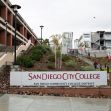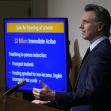California Governor Gavin Newsom has vetoed a bill that would have allowed undocumented students to work on public university campuses, citing potential conflicts with federal law. Assembly Bill 2586 aimed to grant students without legal immigration status the opportunity to hold on-campus jobs at the University of California (UC), California State University (CSU), and California Community Colleges. However, Newsom expressed concerns over the legal risks of violating federal statutes that prohibit the hiring of undocumented individuals.
In his veto message, Newsom acknowledged his support for expanding educational opportunities but emphasized the potential criminal and civil liabilities state employees could face if the law proceeded. He suggested that the UC system should seek declaratory relief from the courts to address the legal questions raised by the bill.
The proposed legislation sought to prevent universities from disqualifying students based on their inability to provide federal work authorization, except in cases where such proof is explicitly required by law, like for federal work-study jobs. According to Assemblyman David Alvarez, the bill's author, this would have benefited an estimated 45,000 undocumented students in California who currently lack access to on-campus job opportunities.
The veto follows a similar stance taken by the UC Board of Regents, which earlier decided not to move forward with hiring undocumented students. UC President Michael Drake emphasized that the university found no viable legal path for implementing such a policy under current federal laws after consulting legal experts. The 1986 Immigration Reform and Control Act makes it illegal for employers to hire undocumented workers, which could jeopardize federal grants and contracts for the university system.
The bill was part of a larger movement known as “Opportunity for All,” which emerged at UCLA in 2022. Supporters argue that the 1986 federal law does not apply to state entities like the UC system. However, both the university and Governor Newsom have expressed skepticism about this legal theory.
This veto marks the second time in September that Newsom has rejected legislation aimed at expanding benefits for undocumented individuals. Earlier this month, he vetoed a bill that would have made undocumented immigrants eligible for state-funded home purchase assistance programs, citing similar concerns about legal and financial risks.
Advocates for undocumented students are disappointed by the decision, with Assemblyman Alvarez calling the veto a “profound disappointment.” Meanwhile, Newsom has advised UC to pursue a legal challenge to clarify the issue in court before moving forward with such policies.






